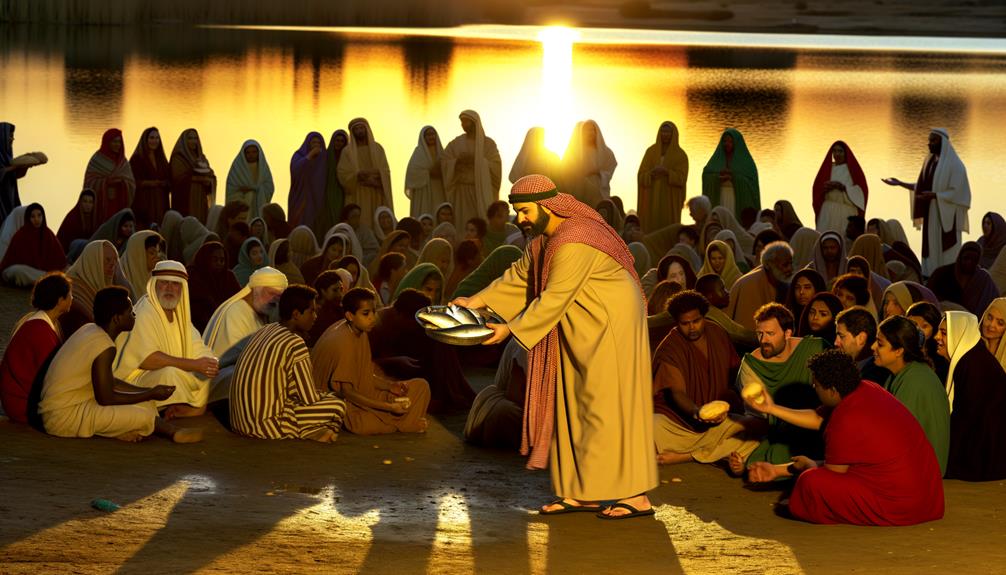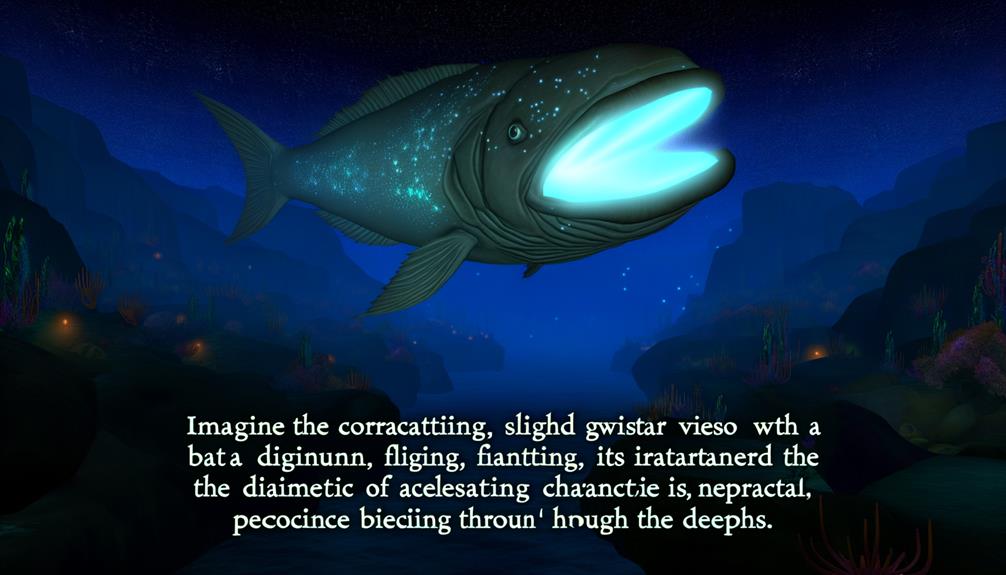Spiritual Meaning of Fish in the Bible: Faith and Abundance
Fish in the Bible symbolize God’s boundless provision, miraculous interventions, and the essence of discipleship. You’ll find them as instruments of divine abundance, such as Jesus feeding the five thousand.
Fish also signify the transformative power of faith through narratives like Peter’s miraculous catch. Jonah’s encounter with the great fish underscores themes of repentance and divine mercy.
Additionally, early Christians used the fish (Ichthys) as a clandestine symbol of faith during persecution. Each instance points to God’s ability to meet physical and spiritual needs, inviting you to explore their deeper significance in biblical teachings.

Spiritual Meaning of Fish in the Bible: Symbol of Faith, Abundance, and Divine Calling
| Biblical Reference | Spiritual Meaning |
|---|---|
| Jesus Feeding the Multitude | Divine provision, miraculous abundance |
| Fishermen Disciples | Calling, spreading faith, evangelism |
| Fish as Christian Symbol | Identity in Christ, faith in action |
| Jonah and the Fish | Redemption, obedience, second chances |
| Water and Fish Together | Spiritual cleansing, new life |
Fish as a Symbol of Provision

In the Bible, fish frequently symbolize God’s provision and sustenance for His people. When you examine various biblical narratives, you’ll notice that fish appear during moments of divine intervention, serving as a tangible reminder of God’s care.
For instance, in the book of Jonah, God provides a large fish to save Jonah from drowning, underscoring His protective nature.
Additionally, in Matthew 14:19, Jesus feeds five thousand with just five loaves and two fish, illustrating God’s miraculous ability to meet physical needs.
The Miraculous Catch
Through the narrative of the miraculous catch of fish, the Bible exemplifies God’s omnipotence and His ability to transform scarcity into abundance.
When Jesus instructs Peter to cast his net after an unfruitful night, the result is an overwhelming catch, signifying divine intervention and provision.
This miracle underscores the faith required to trust in God’s commands, even when circumstances seem dire. It also illustrates how God’s blessings often exceed human expectations.
By recognizing this event, you see a deeper spiritual lesson: God’s power operates beyond natural limitations.
The miraculous catch encourages you to rely on divine guidance, affirming that faith and obedience can lead to transformative outcomes, turning emptiness into plenitude.
Feeding the Multitudes

In the narrative of feeding the multitudes, you witness fish as a profound symbol of abundance and divine provision.
Christ’s miraculous act not only showcases His compassion but also underscores the miraculous nature of God’s care for His people.
This event invites you to reflect on the spiritual significance of fish as an emblem of sustenance and divine generosity.
Symbol of Abundance
The miraculous feeding of the multitudes with just a few fish and loaves of bread exemplifies God’s boundless provision and generosity.
When you contemplate this event, it becomes clear that fish symbolize abundance in the biblical narrative. Jesus’ ability to multiply limited resources to feed thousands underscores the notion that divine resources are inexhaustible.
This miracle isn’t just a historical recount; it’s a profound lesson in faith. By trusting in God’s provision, you acknowledge that scarcity in the material world doesn’t limit divine generosity.
The fish, thus, serves as a potent symbol of God’s ability to provide abundantly, reinforcing the belief that faith in divine providence can transcend earthly limitations and fulfill all needs.
Divine Provision Demonstrated
Witnessing Jesus feed thousands with just a few fish vividly illustrates divine provision in action, showing that God’s generosity knows no bounds.
This miraculous event underscores a profound theological truth: God supplies our needs abundantly, often surpassing human expectations.
When you reflect on this narrative, consider the symbolic weight of fish as a vehicle for divine sustenance. It highlights a recurrent biblical theme—God’s ability to provide, even in seemingly impossible circumstances.
Compassion and Miracle
Frequently, the account of Jesus feeding the multitudes demonstrates profound compassion intertwined with divine power, offering a compelling proof to His miraculous capabilities.
You can see Jesus’ deep empathy for the hungry masses, reflecting His unyielding care for human needs.
This miracle isn’t just about multiplying loaves and fish; it’s about revealing the boundless nature of divine generosity.
By transforming a meager offering into a feast, Jesus highlights the spiritual principle that even the smallest act of faith can yield abundant blessings.
This event invites you to recognize that divine intervention often manifests through acts of compassion.
As a result, the feeding of the multitudes becomes a powerful demonstration of God’s loving provision and the miraculous potential of faith.
Fish and Discipleship
In examining the symbolism of fish in relation to discipleship, one finds a profound connection between Jesus’ call to His followers and their mission to become ‘fishers of men.’
When Jesus invites Simon Peter and Andrew to follow Him, He promises they’ll ‘catch men‘ (Luke 5:10). This metaphor signifies a transformative journey from ordinary fishermen to spiritual leaders.
The act of fishing, requiring patience and skill, mirrors the perseverance needed in evangelism. You must understand that discipleship involves guiding others towards faith, much like how fishermen draw fish from the sea.
Embracing this analogy deepens your comprehension of the commitment and dedication essential to spreading God’s word, reflecting the true essence of being a disciple.
Jonah and the Great Fish

Understanding Jonah’s encounter with the great fish reveals profound lessons about obedience, repentance, and divine intervention in one’s spiritual journey. When Jonah fled from God’s command, he faced dire consequences.
The great fish, often misconceived as a mere vessel of punishment, actually symbolizes God’s mercy, providing Jonah a chance for reflection and repentance.
| Aspect | Insight |
|---|---|
| Disobedience | Jonah’s initial flight from Nineveh |
| Divine Intervention | The storm and subsequent swallowing |
| Repentance | Jonah’s prayer inside the fish |
| Redemption | Jonah’s deliverance and renewed mission |
You see, Jonah’s time inside the fish represents a transformative period, emphasizing that divine correction aims to restore, not condemn. This narrative urges one to heed God’s call, embrace repentance, and trust in His redemptive power.
Fish in Early Christian Art
Early Christian art frequently featured the fish symbol, highlighting its profound theological significance and its role as a covert emblem of faith.
You’ll find that this imagery served multiple purposes in a religiously tumultuous environment. It wasn’t just an artistic motif but a silent representation of Christian identity.
- Eucharistic Significance: The fish symbolized Christ’s sacrifice, mirroring the miraculous feeding of the multitudes.
- Baptismal Imagery: Fish were often depicted in baptismal fonts, representing new life in Christ.
This multilayered symbolism in early Christian art helped reinforce theological teachings and provided a means for clandestine worship.
Understanding this context deepens your appreciation of these ancient visual expressions of faith.
The Sign of the Fish

You’ll find that the Sign of the Fish, or Ichthys, holds profound significance in early Christian symbolism, often used as a secret code among believers.
During times of persecution, Christians employed this emblem to identify one another discreetly. This symbol, rooted in the Greek word for fish, encapsulates a rich tapestry of faith and survival.
Early Christian Symbolism
The sign of the fish, often referred to as the Ichthys, embodies a profound emblem of early Christian identity and clandestine communication.
As you explore its significance, you’ll discover its multifaceted role in the nascent church.
The Ichthys symbol wasn’t merely a mark; it encapsulated essential elements of the Christian faith:
- Theological Doctrine: The Greek word ‘Ichthys’ forms an acronym for ‘Jesus Christ, Son of God, Savior.’
- Communal Identity: It served as a discreet method for early Christians to recognize fellow believers.
Understanding the Ichthys deepens your appreciation of its integral role in early Christianity’s spiritual and social fabric.
Ichthys and Persecution
In times of intense persecution, early Christians used the Ichthys symbol as a covert means to affirm their faith and identify each other.
The symbol, resembling a simple fish, held profound significance rooted in Greek language and Christian doctrine. “Ichthys” is an acronym, translating to “Jesus Christ, Son of God, Savior.” This emblem served not only as a secret sign but also as a reminder of Christ’s mission and the believers’ dedication.
Here’s a concise breakdown:
| Greek | English Translation | Meaning |
|---|---|---|
| Ι (Iota) | Jesus | Jesus |
| Χ (Chi) | Christos | Christ |
| Θ (Theta) | Theou | God’s |
| Υ (Upsilon) | Huios | Son |
Understanding this symbol deepens your appreciation of early Christian resilience.
Fish in Parables
Many of Jesus’ parables prominently feature fish, symbolizing themes of faith, provision, and the kingdom of heaven.
In the Parable of the Net, you see fish represent the final judgment where the righteous are separated from the wicked. This parable underscores the importance of spiritual discernment and readiness.
- Faith: Fishing often required patience and trust in God’s provision, illustrating faith’s role in discipleship.
- Provision: Jesus feeding the five thousand with fish reflects divine provision, reinforcing reliance on God’s abundance.
- Kingdom of Heaven: Fish signify the inclusive nature of God’s kingdom, inviting all to partake in divine grace.
Conclusion
In summary, the fish in the Bible serves as a profound symbol, much like a beacon guiding ships through turbulent seas.
It embodies provision, discipleship, and divine intervention, enriching the spiritual tapestry of Christianity.
From miraculous catches to feeding multitudes, the fish’s role is both practical and deeply symbolic.
As you explore deeper into scripture, let the fish remind you of God’s unwavering provision and the call to follow Him with faith and devotion.






